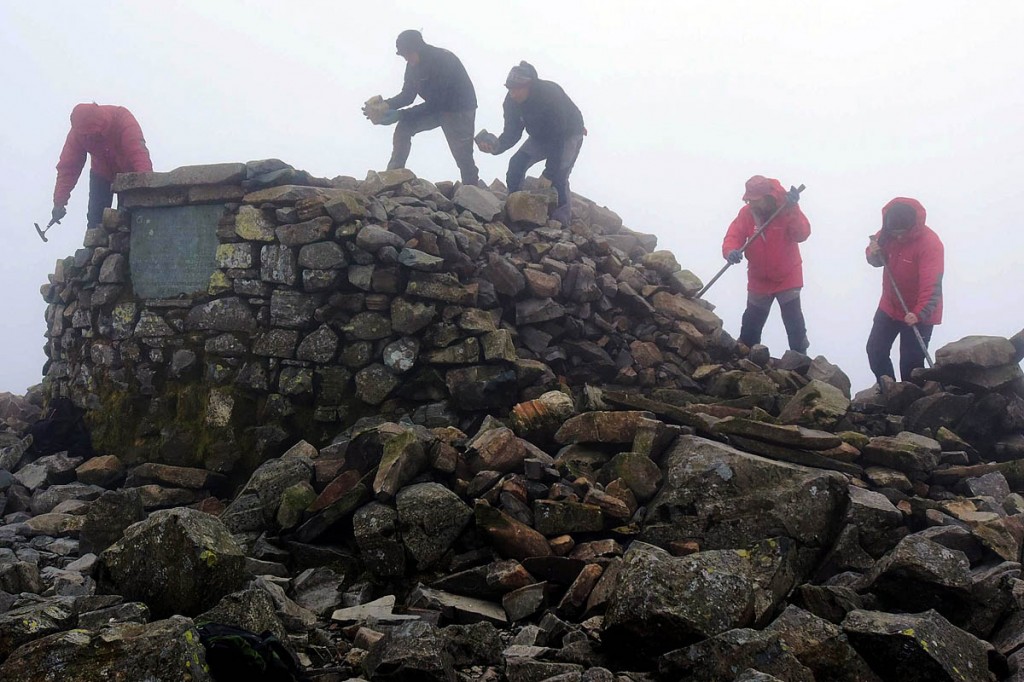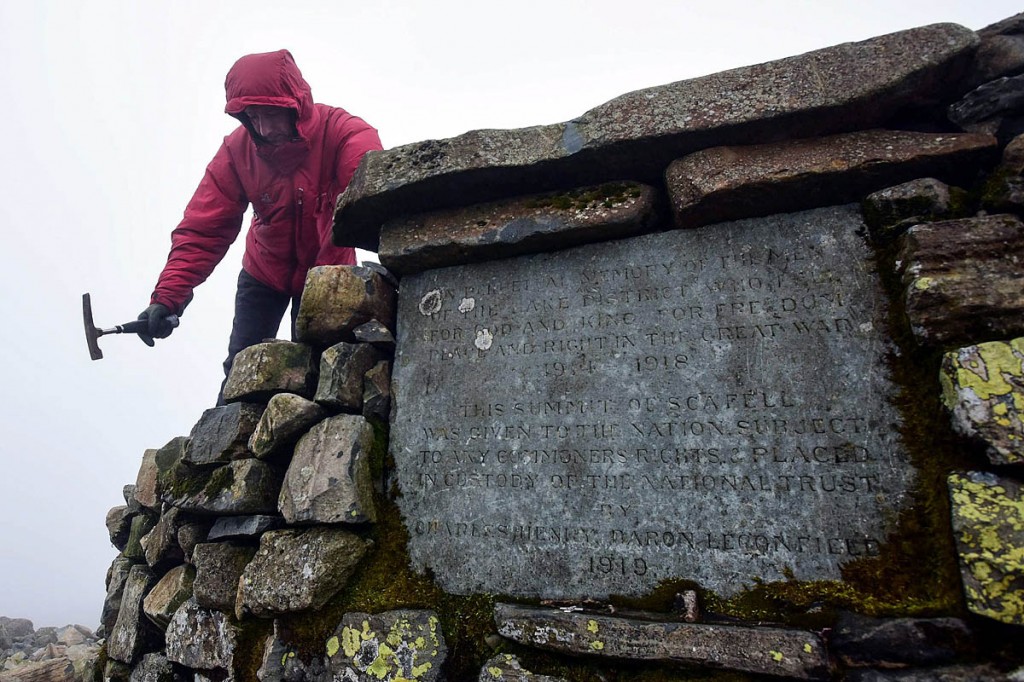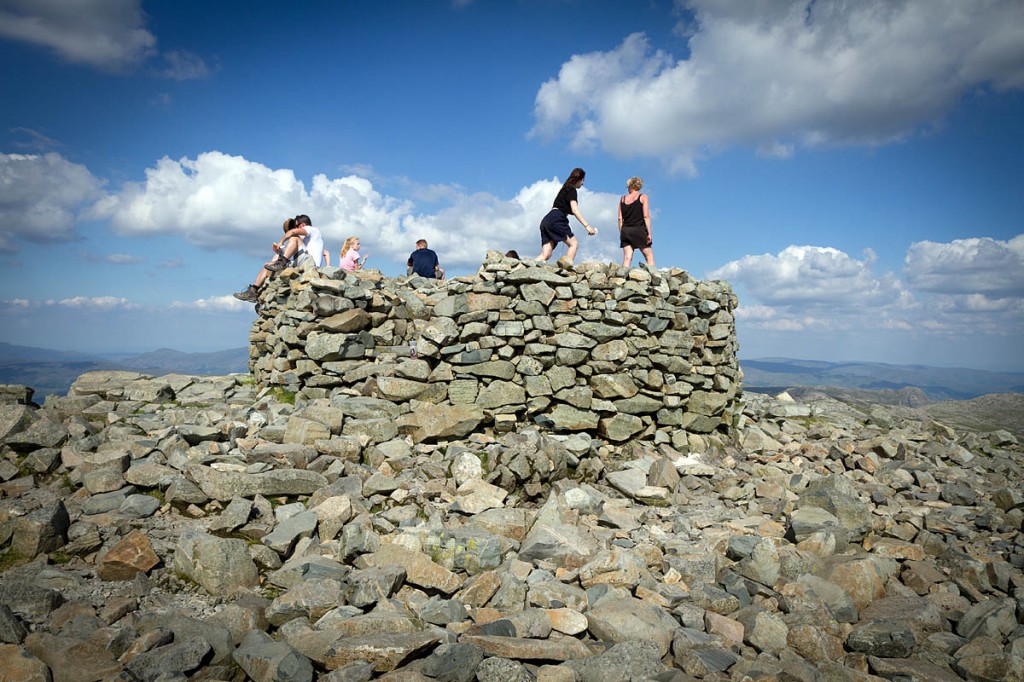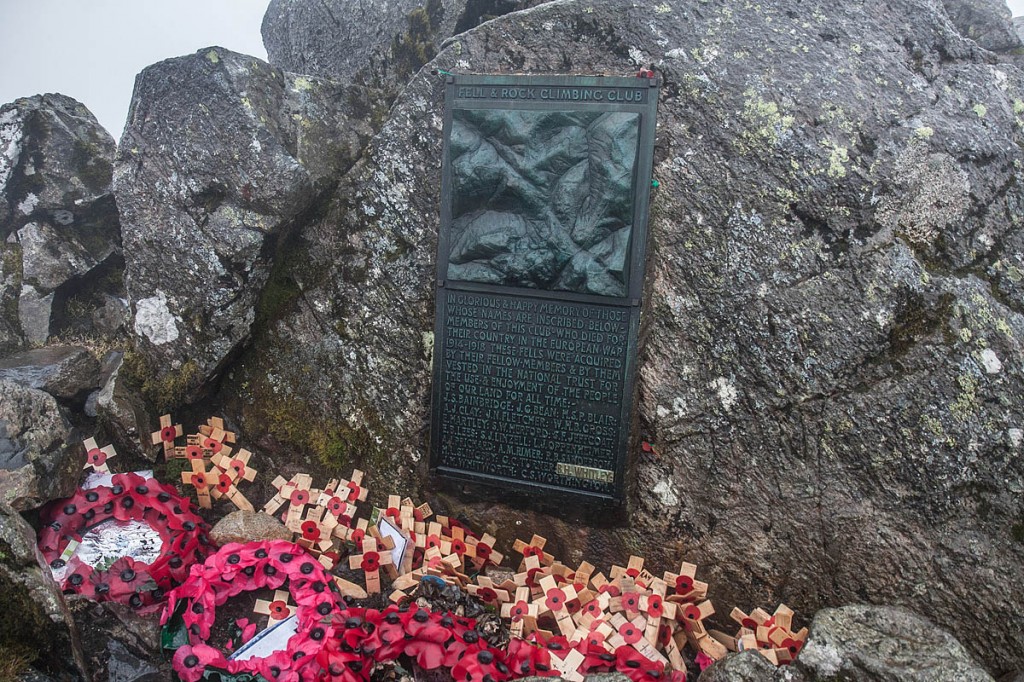A group of rangers has begun work restoring the summit cairn on England’s highest mountain.
The team of seven is camping on Scafell Pike while they carry out the repair of the substantial summit marker, which includes a war memorial plaque.
The work is being carried out by the National Trust, which owns the mountain, to mark the centenary of the end of the First World War.
Rangers expect the work, which entails rebuilding the cairn, to last up to two weeks.
The memorial plaque will be reset into the walls of the 7.5m-wide structure, and the steps leading to the top of the cairn will also be reinstated. The restoration team will also place a time capsule into its stone walls, containing details on the work undertaken, including plans, photos and information about the rangers themselves.
The time capsule will act as a record of the conservation work that goes into maintaining the mountain. Since the cairn was unveiled as a war memorial in 1921, there have been ongoing repairs, with the last major work taking place in the 1980s. The current conservation work is thought to be the most thorough restoration in the cairn’s 97-year history.
Scafell Pike was one of 14 Lakeland summits given to the National Trust in the years immediately after the Great War. Labelled the Great Gift, the peaks are viewed as Britain’s most spectacular memorial to those lost in the First World War.
Scafell Pike was gifted to the National Trust by Lord Leconfield in 1919; in 1920, Castle Crag in Borrowdale was gifted to the trust by Sir William Hamer. Then, in 1923, 12 summits were donated to the charity, including Great Gable, which was given to the trust by the Fell & Rock Climbing Club for people to have the freedom to enjoy the fells.
Lord Leconfield, an honorary member of the Fell & Rock Climbing Club, dedicated his gift ‘in perpetual memory of the men of the Lake District who fell for God and King, for freedom peace and right in the Great War 1914 – 1918’.
Other mountains gifted by the FRCC were Lingmell, Broad Crag, Great End, Seathwaite Fell, Allen Crags, Glaramara, Kirk Fell, Green Gable, Base Brown, Brandreth and Grey Knotts.
The donation triggered a series of endowments to the trust and a marked a transformational moment in the nation’s relationship with beautiful landscapes, paving the way for the formation of the first national parks.
A dedication ceremony, described at the time as ‘as service in the clouds’ was held on top of Great Gable in 1924 and led by author, poet and renowned British mountaineer, Geoffrey Winthrop Young. Young continued to tackle famous peaks after being wounded and losing a leg when working as an ambulance driver at the Battle of San Gabriele in Italy.
He said: “Upon this mountain summit we are met today to dedicate this space of hills to freedom. Upon this rock are set the names of men – our brothers, and our comrades upon these cliffs – who held with us, that there is no freedom of the soil where the spirit of man is in bondage, and who surrendered their part in the fellowship of hill and wind, and sunshine, that the freedom of this land, the freedom of our spirit, should endure.”
As well as being a historically significant site, Scafell Pike is also a fragile habitat, home to rare plants and designated a site of special scientific interest and special area of conservation.
More than a quarter of a million people climb Scafell Pike each year. The trust said the pressure of hundreds of thousands of boots and the Cumbrian weather lead to erosion of paths, which is an ongoing maintenance challenge. The conservation charity estimates around half a million pounds is needed to prevent further decline in the condition of the mountain.
Sam Stalker, the National Trust’s lead ranger on Scafell Pike, said: “It’s great that so many people are able to enjoy Scafell Pike and the surrounding peaks each year. The mountains will be here forever, but they need ongoing care.
“Repairing the cairn is just part of the work we’ll be doing this year to keep Scafell Pike looking its best. It’s an exciting opportunity to share what we’re doing with our visitors and show them the hard work that goes into maintaining the Lakes for them and future generations to enjoy.”
A project supported by the Arts Council England and the Arts and Humanities Research Council will bring together musicians and choirs for a ‘song cycle’ across the 12 mountains of the Fell & Rock Climbing Club gift.
On Armistice Day, the National Trust will light a beacon on top of Scafell Pike, just as Lord Leconfield did on Peace Day – 19th July 1919. Peace Day was Britain’s chance to really recognise and celebrate the end of the First World War. While Armistice Day, commemorated annually, marks the ceasefire, it took until the 19 July 1919 for both sides to sign the official peace treaty.
Marian Silvester, General Manager for the National Trust, said, “Millions of people visit the Lake District each year, but few are familiar with the story behind these mountains, which we are extremely proud to look after.
“By repairing Scafell Pike’s cairn and re-dedicating the peaks, not only are we remembering the past, but looking to the future to ensure this inspiring landscape can be enjoyed by generations to come.”




Rod Hepplewhite
10 May 2018A thoroughly enjoyable article on an excellent project. The summit cairn has been suffering from Scafell Pike's popularity for some time. I have to admit that Scafell Pike's summit is far from my favourite Lakeland top, although I always enjoy the walk there and news of this much appreciated work will encourage me to devise a new route for sometime later this year.
On a different but connected subject, I visited Thornthwaite Crag on Bank Holiday Monday (7th May) and must report that 'The Beacon', the summit pillar cairn, is starting to collapse and is in need or some attention, sooner rather than later.
Jon
14 May 2018I would vastly prefer a far smaller, more elegant cairn, but I suppose that's a minority view.
Paul
14 May 2018Wish they’d put a nice marker on Blencathra , like the one on Skiddaw with the surrounding fells on
Bob
20 May 2018Grough received the following from Peter Smith on behalf of Fell and Rock Climbing Club of the English Lake District
I read with some interest the Grough article on 10 May 2018 ‘National Trust rangers begin work restoring Scafell Pike summit cairn’. It is splendid. Well done.
Without seeming to whinge I want to protect your editorial integrity by correcting some of the stuff given to you because this project will reappear and expand up until November 2019.
1 Scafell Pike Peace Day 19 July 1919: the whole event was undertaken by FRCC. The flares were lit by FRCC members NOT by Lord Leconfield. He was not present.
2 That event did lead, a few months later in the autumn of 1919, to Lord Leconfield gifting the summit ground of Scafell Pike to the nation.
3 In 1920 Lord Leconfield was made an honorary member of FRCC.
4 Concurrent with 1 and 2 above, yet totally detached, was the desire of FRCC to create its own memorial to honour those club members that died in action during WW1. For several months following the end of the war many suggestions had been debated: “The Great War that ended on 11 November 1918 had taken the lives of twenty of our members. The committee, meeting at Coniston in February 1919, pondered about a club war memorial and decided to refer the whole matter to the next annual general meeting in November.”
8 November 1919: “The president, PS Minor, took the chair and in his usual hearty manner welcomed the members present and congratulated the club on such a large gathering, a happy reunion after the trials and stress of war days. Club war memorial – this question having been previously deferred to the annual general meeting it was again discussed and, after several schemes had been debated upon, the unanimous feeling was in favour of a scheme proposed by HP Cain that the club should enter into negotiation with a view to purchasing Pillar Rock or part of Great Gable and present such purchase into the hands of the National Trust and so perpetuate the memory of those of our comrades who had given their lives in the war.”
Owners of large estates were not favourably disposed to sell tracts of land to a small club comprising of 450 walkers and climbers that lacked the financial substance to manage that land effectively. Many obstacles arose causing much disappointment and frustration. Determination and perseverance over a prolonged period won through. The outcome was on a much greater scale than originally envisaged; the memorial became greatly enhanced and tremendously more fitting.
19 May 1923 – a letter to all members of FRCC:
“The time has now come when it is the privilege of the committee to put before you the war memorial scheme. After much delay, which they think you will consider to have been not without its compensation, they have negotiated for the purchase of a very large portion of the centre of climbing and walking in the district.
This comprises the tops of twelve mountains, viz: Kirkfell, Great Gable, Green Gable, Brandreth, Grey Knotts, Base Brown, Seathwaite Fell, Glaramara, Allen Crags, Great End, Broad Crag and Lingmell, together with almost all the land over 1,500 feet, bounding them on the sides facing the Seathwaite to Wasdale track.
Arrangements are being made to hand this whole area over to the National Trust who will comply with the conditions laid down by the club and safeguard its interests in perpetuity.
It has been considered desirable definitely to associate with this most appropriate memorial the names of those members who gave their lives in the war, and for this purpose a bronze tablet will be placed on, or near, the summit of Great Gable.
The committee confidently invite all members to support this memorial as generously as they can, realizing that in so doing they do honour to their comrades, while preserving to their successors for all time the finest area of fell and rock in England.”
5 At the FRCC AGM held in the Black Bull Hotel, Coniston, on 13 October 1923 newly elected president Arthur Wakefield transferred the title deeds for the purchased land to the National Trust.
6. Unveiling the war memorial tablet: if any single member was deemed to have led this dedication ceremony it was Rev John Smith; NOT Geoffrey Young. The plaque was unveiled by FRCC president Dr Arthur Wakefield. Young read The Tribute, his own composition.